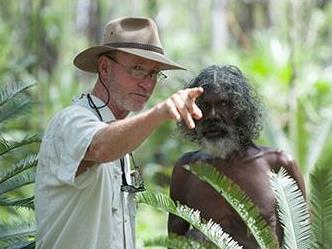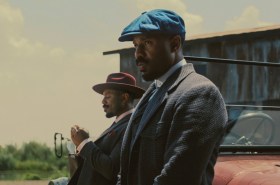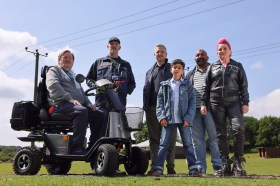Rolf de Heer and David Gulpilil. Production still.
Rolf de Heer explained that Charlie’s Country was an evolution rather than a moment of decision. “You could say that it started 15 years ago when I met David [Gulpilil] for the first time, because David’s a terribly important part of the whole concept. I suppose it really started this time when I learnt that David was in jail,” Rolf said. David Gulpilil is one of Australia’s best known Indigenous actors. He has appeared in many Australian productions, including Crocodile Dundee, Australia, Rabbit Proof Fence, The Proposition and Storm Boy.
Rolf went to see David in the Darwin jail from his home in southern Tasmania. David had been incarcerated for violence as a result of alcohol, and Rolf suspected that when he got out, nothing would have changed and it would happen again. Rolf asked him, “‘What are you going to do when you get out?’ and his reply was ‘Dunno.’ I said, ‘What do you want to do?’ and to cut a long story short, he said he wanted to make another film with me.”
Rolf thought about it, and didn’t want his visits to David to be an empty gesture. It made a lot of sense at the time for Rolf to go through with making a film. At the time, he wasn’t working on any other projects and it was unlikely he’d make another film within the next year, so “in this case, what it meant was that David could have something to look forward to while he was in jail.”
David’s comment about wanting to make another film with Rolf was said at the end of Rolf’s first visit, and more visits were planned for the following days. Rolf began to consider the methodology more fully, “Not what was going to be in the film, but how were we going to make a film? How could this be? What would its shape be? Not what it’s about. David was depressed. Afterwards I worked out that that’s all it was – depression – but the life had gone out of him and I didn’t know if he still had it as an actor in the way that he had it before. I thought okay, what we have to do is this: if his brain isn’t functioning as well anymore and this could well be the case because he gave it a fearful beating before he got incarcerated. If his brain isn’t functioning as well anymore, then we have to find a way to help him with that, and one of the things is dialogue, for example. He’s always had fair difficulty learning English dialogue. He works very hard at it and ultimately does it very well, but gee he has to work at it because it’s his fifth or sixth language.”
As a result, Rolf decided that in the film David could speak any language he wanted and the structure needed to be able to cope with that. The decision was therefore made not to write too much specific dialogue: “let’s leave it loose and see what comes,” Rolf said. The decision was also made to put things into the film which David was already familiar with, “things that he knows and things that he can access.” The film isn’t autobiographical, but contains “things that he’s in some ways close to.”
Rolf explained that David has never lived in Ramingining and wasn’t impacted by the intervention for example, as Darwin has different laws. “But what David is familiar with is the frustrations brought about by constant changing of the law,” Rolf said. “The way the Yolngu people see things up there is that the law has been the same for 10,000 years. You white fellas, you change your law every week. That’s not a law. You can’t respect that. And they get extremely frustrated by laws changing as rapidly as they do. David has experienced that. He’s experienced the frustration, so he can perfectly well play Charlie under the intervention and can draw on that stuff really well.”
For David to be able to access this, it forces the film to be contemporary. Rolf explained that this was in a sense, the first major decision made. At this point, Rolf didn’t know when it would happen, and didn’t know what the conditions of his parole would be. He did know however that it would be made in the Northern Territory, due to language and so on.
Twenty three hours after the first visit to the jail, Rolf returned with a vague budget and the outside parameters. He said to David, “Let’s give it a go. Let’s make a film. I can’t guarantee it. I can’t guarantee it’ll be financed. But we can try. At that point, he began to talk to me, not saying ‘this is an idea’ or ‘I want this in the film’ because he doesn’t talk like that. He was presenting things to me. Presenting snippets, ideas, not even ideas but just… And it was my job to sift what he says and if anything in it interests me, I can ask a question about it, or I can just let him keep talking. That’s generally the sort of process that we went through.” Rolf would think about things a bit more, finding a form for some of what David had told him. He’d then talk to David about it when he next visited. David and Rolf are both credited as the writers on the film.





